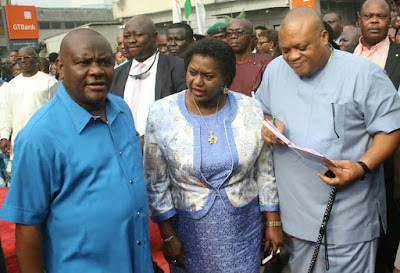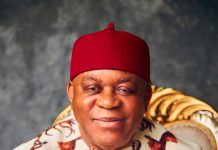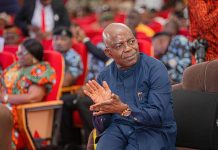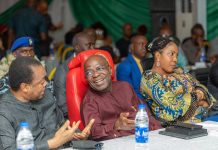•The Rivers State governor owes Nigerians and this democracy an explanation
over his statement about Supreme Court verdict
The position of governor is so high that flippancy of expression is anathema. Also, the office of a justice of the Supreme Court of Nigeria is so sacred that any suggestion of compromise comes across like putrefaction.
Both high pedestals suffered from suggestions of great abuse when the Rivers State Governor, Nyesom Wike, gave a thanks-giving oration in Port Harcourt and made the following remarks: “Let me thank our former governor, Dr. Peter Odili. He will call me midnight to tell me what to do…he will say ‘go so so place.’ I took all his advice, and here we are today.”
This oration of gratitude emanated from the lips of Wike shortly after the Supreme Court of Nigeria stamped its verdict in his favour in his gubernatorial case against his All Progressives Congress (APC) candidate, PetersideDakuku.
Last week, the newspapers reported that Governor Wike was sighted at the session of the Body of Benchers. All of these developments show that a strong sense of moral perversion is in the air in the case of Governor Wike and the resolution of the gubernatorial election crisis of Rivers State.
We can say that, to all intents and purposes, the matter is over in a purely legalistic sense. The Supreme Court is the court of last reference, and since the judgment has been delivered, it is well-nigh impossible to return to another whirligig of new prosecution. But the moral force of the narrative still overhangs the polity.
Anyone who learned of Governor Wike’s words will be tempted to ask a few legitimate questions. What did he mean when he said that the former Rivers State Governor Odili called him at midnight, and told him what to do? What did he mean by the assertion that he asked him to “go to so and so?” it means a lot to anyone who wants to know the truth and worries deeply about the trajectory of our democracy. He linked the midnight advice of Dr. Odili with “here we are today.”
Today in that context was clear: a thanksgiving service for victory at the Supreme Court. The intimations are invidious for our society. When a governor wins in court and implies that a piece of advice from another prominent figure led to the victory in the highest court in the land, it boggles a democratic sensibility.
The nation ought to know where he went, who he met, when he met them and how many times. We want to know what the context of the meeting amounted to, and how all of these interactions led to the verdict of victory from the Supreme Court.
If he made those words out of flippancy, he needs to apologise, and even that would mean he does not know that flattery or overweening praise is out of sync with his high office. It also implies he does not appreciate the gravity of language and the power of context. But rather than do all these, he merely questioned the motive of those who asked biting question about his apparently Freudian confession.
Whatever the reason he was at the Body of Benchers, we expect the interactions to be transparent. Even at that, we have a few questions. First, the same Governor Wike ran into a moral and legal controversy when he tried to pay a visit to the Chief Justice of the Supreme Court.
The CJN, Mahmud Mohammed, had publicly disavowed any such visit and Wike said it had nothing to do with the governorship case in court. Even at that, for the purpose of propriety, the chief justice should have recused himself from the case.
The release of the reasons for the Supreme Court verdict finally cleared the air about the thinking of the lordships on the Rivers State election. It is clear that the Supreme Court preferred pettifogging technicalities to the ever important matter of substantial justice. One of the reasons advanced for throwing out the verdicts of the lowers was that the tribunal was not properly constituted. This is unacceptable. If the court was not properly constituted, did that mean that if Wike did not get fair hearing, so his counterpart Peterside should become a victim of a procedural error? By that judgment, the Supreme Court preferred fair hearing to Wike instead of Peterside This was not justice, but partiality.
The court also said that card readers were tangential to the rules of electoral voting. They implied that if anyone came with a case based on card readers, it ought to be discountenanced in favour of the voter’s register. This was a fraudulent logic.
To imply that the card reader was not central and to wait for the National Assembly to make a law first is to throw jurisprudential logic out of the window. We are all witnesses in this country to the process of the entrenchment of the card reader. For, before our eyes, the Independent National Electoral Commission (INEC) presented its case before the senate, and the National Assembly approved billions of Naira for the purchase of all the equipment.
There was nothing clandestine about it. The apex court executed a rigmarole in its argument, as though it wanted the answer to determine the logic. We know that the card reader, for all its imperfection, gave us the best election in the circumstances. We have been in a process for about a decade to create platforms through the INEC that will make elections less about hoodlums or big men but about the wise choice of the people. To do this we needed the full-proof technology. The Supreme Court reversed this with one indiscreet verdict.
We cannot run from technology. Our democracy must come to terms with it. The court’s disavowal of evidence of widespread violence was perhaps the most immoral of its decisions. The scores of deaths and injured, the dislodgment of voting boxes with all its implication for distortion of the people’s will in terms of the final results meant nothing to the lordships.
The verdict, to put it mildly, was a recipe for violence and electoral robbery. This negates the cathedral dignity and moral grandeur we ask from the apex court. What is left for INEC and the over 80 elections billed for this year? The Supreme Court has given them a leeway to turbulence.
It is sad and we hope that good sense will prevail and the society would find a way to rise above the ill grace of the thinking of the Supreme Court.
An Editorial by THE NATION NEWSPAPERS








